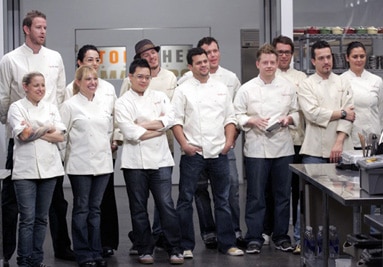Not Molecular Gastronomy
Jay Rayner gives background on his knowledge of Wylie prior to the show, and his argument with James Oseland.

The last time I saw Wylie Dufresne, prior to this week’s show, he was leading his brigade in a charge out of the kitchen, to take on a stroppy Wall Street jerk who was giving the sommelier at his restaurant some grief. It was a peculiar but very Wylie sight, his long hair trailing behind him in the draft. The moment came at the end of an equally peculiar evening in which I had conducted a high-end restaurant crawl through Manhattan’s greatest restaurants – Jean Georges, Per Se, Bouley, Eleven Madison finishing with dessert at Wylie’s wd~50 – for my book, The Man Who Ate The World. In the book I described him as looking "like a cross between an Alabama backwoods man limbering up to shout ‘squeal little piggy,’ and a computer nerd," and I can do no better now. The passionate and fiery Wylie I met then, is the one we met on tonight’s episode, cussing and cursing his way through the vending machine challenge at what he perceived to be the way he had let himself down.
(Climb inside these brackets for a moment. Just before we were due to start shooting we were asked to list any relationship or experiences we might have had with any of the competing chefs. Although I knew almost all of them by reputation, there were only two: Wylie and Douglas Rodriguez who, one night in London a few years back, offered to take me outside and kick ten tons of crap out of me because I had once called him "gastronomically illiterate"
in a review. Touchy people, chefs. As it happened, he was a competitor on one of the two shows my Visa problems kept me from being involved with, and Gail Simmons got to critique him. Shame.)
Intriguingly, on paper, tonight’s two challenges – the vending machine, and the Lost challenge, which required the use of canned and bottled goods – should have favoured both Wylie and Graham Elliot Bowles. Both of them are fascinated by those sorts of ingredients but, while, they did well, it was not to be. Their presence did, however, lead to some interesting critic-on-critic action. Gael Greene said from the very start that she had no time for the
kind of food Wylie made calling it "chemical," which is just cobblers. All cookery is basically chemistry; people like Wylie simply engage with that. But it seemed bizarre to me that a critic should claim a dislike for a whole genre of the culinary arts on principle. To be fair though, she did accept that Wylie’s dish worked. And I’m sure she thought some of my views ridiculous.
Meanwhile, James and I had a baby backstage row over the use of the phrase Molecular Gastronomy. You may recall that at one point Wylie tried to dismiss it as being less than helpful — as indeed it is. It means absolutely nothing. A couple of years ago the men most associated with it – my countryman Heston Blumenthal at the Fat Duck and Spain’s Ferran Adria of El Bulli – issued a statement, with others, declaring the term dead. You can read it
here. Even so James still wanted to use it in his summation. I said it would make us look, well, silly. It’s great to be paid to argue with people. In the end the phrase was used, but not by James.
As to the Lost challenge, it was clearly a lot of fun, but mostly because of the choice of guest judges. What the production needed from people invited along to help us critique was noise and views. And frankly you can’t do better than a bunch of the writers from one of the top-rated network shows. Because that’s exactly what they do for a living: every day they go to work, sit in a room together, and try to be funnier than each other and cleverer than each other, and noisier than each other. Give them free food as well and, hell, the challenge is to shut them up.
Carlton Cuse, Damon Lindelof, and their team more than sang for their supper. They pretty much tap-danced for it too. And what a supper it was: not just Wylie’s superlative chicken - when I got some – but Graham’s kicking take on a salad Nicoise, and Suzanne’s fabulous uni risotto. Elizabeth’s braised boar? Not so much, but then you can’t win ‘em all.
Next week it’s truly gutsy stuff, which makes me very happy indeed, because I’m a gutsy man. You’ll see what I mean.
Jay Rayner is the author of The Man Who Ate The World, published now in paperback by Henry Holt.



